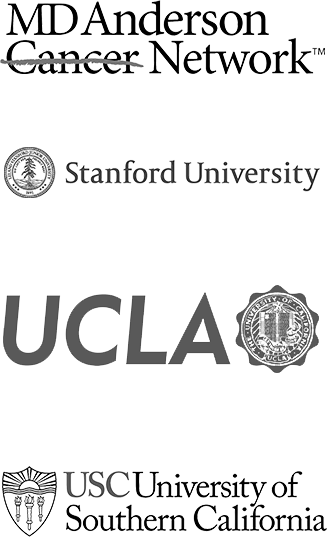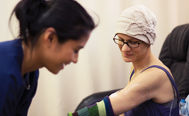 As with most forms of cancer, no two cases of breast cancer are exactly alike. Breast tumor behavior can be especially complicated and unpredictable, and the type of breast cancer treatment a patient receives, and potential outcomes will depend in large part on the specific makeup of the breast cancer cells.
As with most forms of cancer, no two cases of breast cancer are exactly alike. Breast tumor behavior can be especially complicated and unpredictable, and the type of breast cancer treatment a patient receives, and potential outcomes will depend in large part on the specific makeup of the breast cancer cells.
Hormones and Breast Cancer
Like normal, healthy cells, some breast tumors contain receptors for the hormones progesterone and estrogen, which send signals to the cells promoting continued growth. Approximately two out of three breast tumors are hormone receptor positive.
Estrogen-receptor-positive (ER+) tumors receive signals from and can grow when exposed to estrogen.
Progesterone-receptor-positive (PR+) tumors receive signals from and can grow when exposed to progesterone.
Breast cancer tumors that do not contain receptors for either estrogen or progesterone are known as hormone receptor negative.
Hormone therapy can be used to treat receptor positive tumors. Hormone therapy can help lower the levels of estrogen and progesterone in the body, and to block the hormones from signaling continuous cell proliferation (growth) in the tumors.
Hormone Related Breast Cancer Risk and Prevention
While some cases of breast cancer can be hereditary and result from specific gene mutations, such as the BRCA1 and BRCA2 genes, genetic and hereditary factors typically account for as little as 5% – 10% of all breast cancer diagnoses. Due to the relationship between estrogen and certain types of breast cancer, there are certain risk factors and lifestyle modifications that women should be aware of in order to understand and help mitigate their breast cancer risk as much as possible.
Factors such as the age a woman starts menstruating and begins menopause can increase breast cancer risk. An earlier period and later menopause expose the body to estrogen for longer periods of time for example, increasing cancer risk. Hormone therapy that includes estrogen and progesterone can also potentially increase a woman’s breast cancer risk.
Contact an oncologist in Los Angeles
To learn more about breast cancer treatment, contact the Cancer Center of Southern California today at 310.879.1099 to schedule an appointment.
Next, read How to Prevent Cervical Cancer



